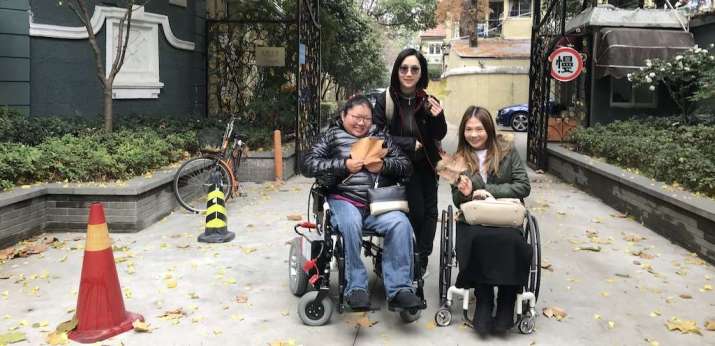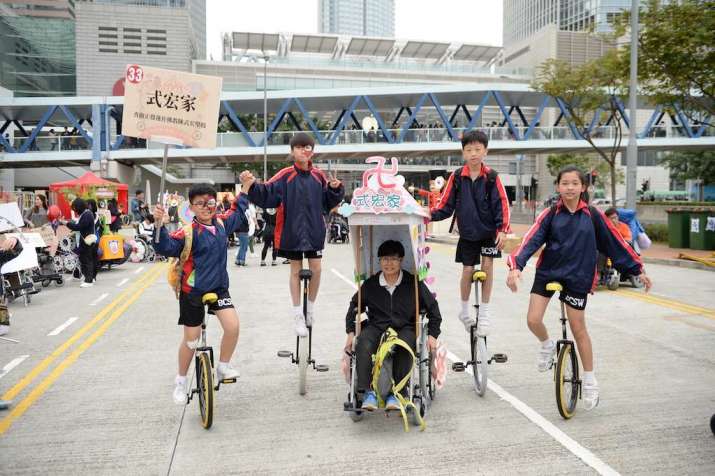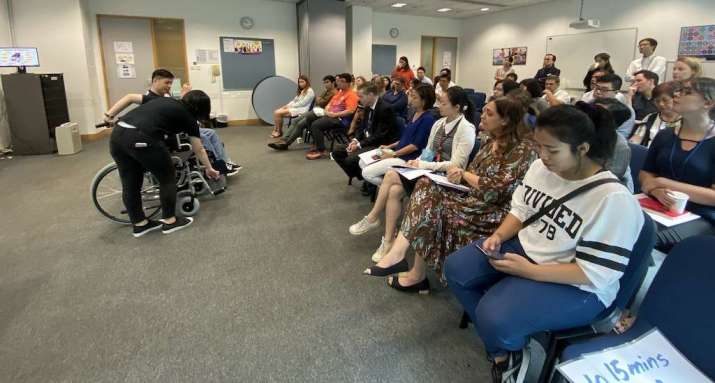
Triumph in adversity, the victory of the underdog, winning against the odds: these are ideas that hold a near-mythic, archetypal place in popular imagination. Not a day goes by without some branch of the media, pop culture, or marketing that tries to shape the image of a product or service around a story of success in hostile conditions through hard work, ingenuity, and determination. Yet we often overlook the real strivers against adversity, those who chug along in our midst but are often invisible until we have the good sense to have an open and frank discussion about their context and struggles. These are people who are disabled, or differently abled, and they have been the focus of Lillian Li’s work at Direction Association for the Handicapped, a social enterprise working to improve the lives of those living with severe physical impairments in Hong Kong.
Lillian has been managing Direction since June 2017, although its history goes back far longer. It was founded as a volunteer organization in 1986, and was registered as an NGO by 1991. Formally given its current name in 1995, Direction was set up as a social enterprise in 2008. With a staff of about 20 members, its scope of activities is ambitious, falling broadly under case support, rehabilitation resources, public education, and policy advocacy. Case support includes visiting members and providing encouragement and emotional support while allowing them to share their experiences, and rehabilitation involves work such as providing a wheelchair repair services and emergency rescues. Direction’s public education entails experiential workshops in schools and other means of inspiring understanding in the public arena, and policy advocacy includes building bridges with other rehabilitation organizations and lobbying government departments and advising on policy.
Lillian had already been volunteering for different self-help groups, but two years ago the directors of Direction entrusted her with giving the organization a fresh trajectory. “I’ve been basically working on rebranding and restructuring these past two years,” she says. “Given our history and principles of ‘mutual help and self-help,’ I’ve had to look at what we want to do and how we want to accomplish our goals. Rabi Yim, the chairperson of Direction, has been extremely supportive of what I’m doing. There are of course difficulties and manpower issues, but when we set our mind to doing things, we suddenly find ourselves with plenty of support and ideas.”

Materialistic and hustling Hong Kong has some way to go in terms of implementing full accessibility provisions for the physically impaired. However, Lillian believes that Hong Kong people are far more warmhearted than stereotypes allow: “A lot of Hong Kong people are actually very kind and will jump at the chance to do good things. More often than not, so-called bigotry or negative attitudes about the disabled are not negative per se, but more to do with unfamiliarity, ignorance, and an uncertainty about how to relate.
“Even something as simple as the bad habit of staring at the impaired—it’s just curiosity that hasn’t been tempered by discretion. Furthermore, the public hasn’t been educated enough about how to interact with those who cannot fit into our society’s unspoken cues and conventions. It takes education to help people be more patient and interact more with those who have severe physical impairments.”
Lillian advocates a bottom-up methodology, with members of Direction often suggesting activities for which the team then prepares to gather resources. “I remember one time when someone in an electric wheelchair suggested a session of war games.” she recalls. “So we needed a wheelchair-friendly venue, equipment that could be used in a sitting posture, and bear in mind this particular individual could not even hold your normal toy gun because their four limbs were not functioning well. A lot of people thought that war games in this context were impossible, but then there was a repairman who helped to install the toy gun on the wheelchair itself, and through a simple pulling movement this wheelchair-bound person would be able to activate the weapon. We also made different designs for those in wheelchairs, tailoring their toy gun mechanism to their physical capabilities and movements. We partnered with Hong Kong Broadband [one of Hong Kong’s major internet providers] to assign some of their staff members to accompany each of the players. This resulted in a delightful session of war games that we initially thought impossible.”

Direction also engages in corporate outreach through workshops hosted by a given company. “These firms obviously have high standards and so it is important that our team matches such standards,” Lillian explains. “Each firm is different, but on average, I would say that multinationals arrange these workshops more easily and often. Local companies want to have them too, but might be limited by a lack of manpower or expertise. I want to add that this is changing, however.”
The notion of rebranding the social enterprise was striking and I asked Lillian why she felt it was necessary. “Not enough people know about our organization, despite our many activities. If we are to project our voice further and highlight what we do, people need to know more about us and trust us. Before I took over in 2017 the organization was fairly modest in its operations, getting the job done without too much fanfare. Yet the lack of knowledge about us among even those in the same field will hinder our progress in the future,” she says, expressing hope of going beyond merely revamping their website or changing their logo, by restructuring how they deliver their services that will allow people to see the vibrancy and optimism of Direction for themselves.
“There is so much to be done,” Lillian concludes. “But in the end we are about fundamental, lasting transformations in the lives of not only our members, but in the public understanding of the severely impaired. In the old days, NGOs, charities, and social enterprises would advocate that wider society have empathy for their members or clients. These days the notion of simple empathy is not only too basic, but perhaps outdated. We advocate equality and understanding as the foundational bases for truly mutual respect between the severely impaired and those who are not. Our members are only human as well, but they truly never give up in ways few are forced to experience. In order to facilitate such shifting paradigms, we push a mindset and message that, when all is said and done, is extremely empowering: that nothing is impossible at both an individual and societal level.”














